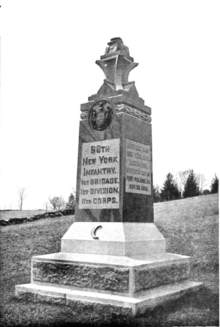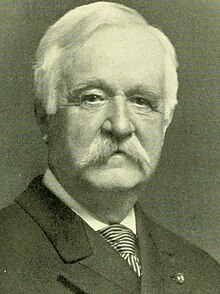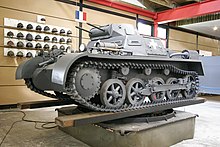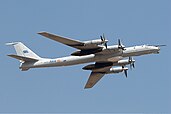Portal:History
The History Portal

History by Frederick Dielman
History is the systematic study of the past. As an academic discipline, it analyzes and interprets evidence to construct narratives about what happened and explain why it happened, focusing primarily on the human past. Some theorists categorize history as a social science, while others see it as part of the humanities or consider it a hybrid discipline. Similar debates surround the purpose of history, for example, whether its main aim is theoretical, to uncover the truth, or practical, to learn lessons from the past. In a slightly different sense, the term history refers not to an academic field but to the past itself or to individual texts about the past.
History is a broad discipline encompassing many branches. Some focus on specific time periods, such as ancient history, while others concentrate on particular geographic regions, such as the history of Africa. Thematic categorizations include political history, social history, and economic history. Branches associated with specific research methods are quantitative history, comparative history, and oral history.
Historical research relies on primary and secondary sources to reconstruct past events and validate interpretations. Source criticism is used to evaluate these sources, assessing their authenticity, content, and reliability. Historians integrate the perspectives of several individual sources to develop a coherent narrative. Different schools of thought, such as positivism, the Annales school, Marxism, and postmodernism, have distinct methodological implications.
History emerged as a field of inquiry in the ancient period to replace myth-infused narratives, with influential early traditions originating in Greece, China, and later also in the Islamic world. Historical writing evolved throughout the ages and became increasingly professional, particularly during the 19th century, when a rigorous methodology and various academic institutions were established. History is related to many fields, including historiography, philosophy, education, and politics. (Full article...)
Featured picture
Did you know (auto generated)

- ... that American Colossus is a biography of a man who was "the most famous sportsman in the world" and "the most forgotten great athlete in American history"?
- ... that one of the longest civil trials in Utah history, with 1,000 exhibits, concerned the purchase of a Salt Lake City TV station?
- ... that the 1976 Philippine film Itim was described as "one of the most remarkable debuts in cinema history" in a 2022 retrospective at the Museum of Modern Art?
- ... that a 2001 book shares the history of a small Tudor community through a 54-year-long "running commentary" by "a somewhat unamiable busybody"?
- ... that American Colossus, a history book that describes how a banker bailed out the U.S. government in 1895, was published around a time when the U.S. government bailed out banks?
- ... that fifteen future Pro Football Hall of Fame players have been drafted by the Detroit Lions?
John Calvin Coolidge Jr. (/ˈkuːlɪdʒ/ KOOL-ij; July 4, 1872 – January 5, 1933) was the 30th president of the United States, serving from 1923 to 1929. A Republican lawyer from Massachusetts, he previously served as the 29th vice president from 1921 to 1923 under President Warren G. Harding, and as the 48th governor of Massachusetts from 1919 to 1921. Coolidge gained a reputation as a small-government conservative with a taciturn personality and dry sense of humor that earned him the nickname "Silent Cal".
Coolidge began his career as a member of the Massachusetts State House. He rose up the ranks of Massachusetts politics and was elected governor in 1918. As governor, Coolidge ran on the record of fiscal conservatism, strong support for women's suffrage, and vague opposition to Prohibition. His prompt and effective response to the Boston police strike of 1919 thrust him into the national spotlight as a man of decisive action. The following year, the Republican Party nominated Coolidge as the running mate to Senator Warren G. Harding in the 1920 presidential election, which they won in a landslide. Coolidge served as vice president until Harding's death in 1923, after which he assumed the presidency. (Full article...)
On this day
February 6: Sámi National Day (1917); Waitangi Day in New Zealand (1840)
- 590 – Vistahm and Vinduyih deposed their brother-in-law Hormizd IV, King of Kings of the Sasanian Empire.
- 1579 – Domingo de Salazar, a Spanish Dominican friar, was appointed the first bishop of Manila.
- 1865 – Finland established its modern system of secular municipalities, separate from church parishes.
- 1922 – Representatives from France, Italy, Japan, the United States, and the United Kingdom signed the Washington Naval Treaty (pictured), agreeing to limits on naval construction in the hopes of preventing an arms race.
- 1987 – Mary Gaudron became the first woman to be appointed a justice of the High Court of Australia.
- Aldus Manutius (d. 1515)
- Isabella Beeton (d. 1865)
- Zsa Zsa Gabor (b. 1917)
- Mary Beth Edelson (b. 1933)
Selected quote
I hate this fast growing tendency to chain men to machines in big factories and deprive them of all joy in their efforts — the plan will lead to cheap men and cheap products.
— Richard Wagner, 19th century German composer
Related portals
More Did you know...
- ... that the Soviet Tupolev Tu-142 (pictured) maritime patrol aircraft was developed in response to the American UGM-27 Polaris submarine-launched ballistic missile?
- ... that Harry Powers said that watching his victims die was more fun than a brothel?
- ... that the effort put forth by the subject of Miró's 1937 Naked woman climbing a staircase and her heavy limbs are thought to reflect the tragedy of the Spanish Civil War?
- ... that 49% of German military losses happened in the last 10 months of the Second World War in Europe?
- ... that Thomas Edison lost a fortune in his ore-milling company, but "had a hell of a good time spending it"?
- ... that American McCaull Comic Opera Company actress May Yohé, once the owner of the Hope Diamond, died poor?
- ... that Egyptian political cartoonist Ahmad Nady took part in the 2011 Egyptian revolution, drawing cartoons while he demonstrated?
- ... that finds unearthed at the Israelite Tower in Jerusalem's Jewish Quarter attest to the Babylonian sack of the city in 586 BCE?
Topics
Categories

History • By period • By region • By topic • By ethnic group • Historiography • Archaeology • Books • Maps • Images • Magazines • Organizations • Fictional • Museums • Pseudohistory • Stubs • Timelines • Chronology • People • Wikipedia historians
WikiProjects
![]() WikiProject History •
Ancient Near East • Australian History • Classical Greece and Rome • Dacia • Former countries • History of Canada • Chinese history • European history • Heraldry and vexillology • Indian history • Jewish history • Medieval Scotland • Mesoamerica • Military history • Middle Ages • History of Science
WikiProject History •
Ancient Near East • Australian History • Classical Greece and Rome • Dacia • Former countries • History of Canada • Chinese history • European history • Heraldry and vexillology • Indian history • Jewish history • Medieval Scotland • Mesoamerica • Military history • Middle Ages • History of Science
WikiProject Time • Days of the Year • Years
WikiProject Biography • Composers • Political figures • Saints • United States Presidents
Things you can do
 |
Here are some tasks awaiting attention:
|
Associated Wikimedia
The following Wikimedia Foundation sister projects provide more on this subject:
-
Commons
Free media repository -
Wikibooks
Free textbooks and manuals -
Wikidata
Free knowledge base -
Wikinews
Free-content news -
Wikiquote
Collection of quotations -
Wikisource
Free-content library -
Wikiversity
Free learning tools -
Wiktionary
Dictionary and thesaurus
- ^ Dyer (1908), p. 1430; Federal Publishing Company (1908), pp. 100–101; Phisterer (1912), pp. 2673–2693.























































